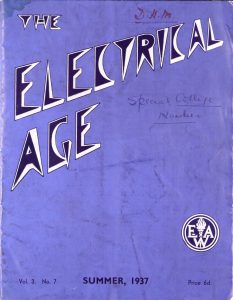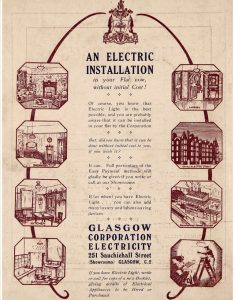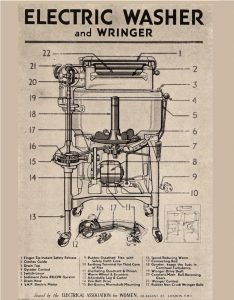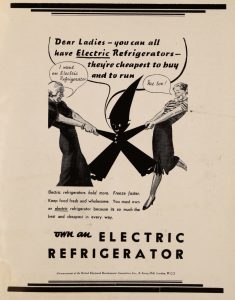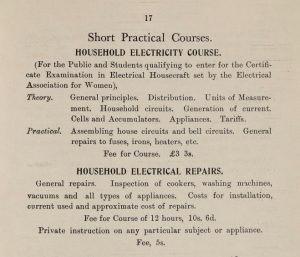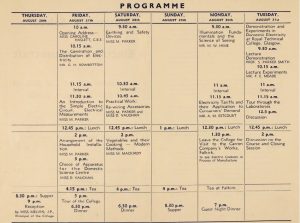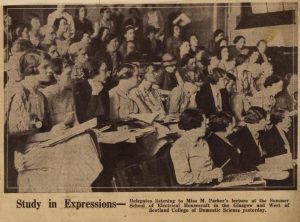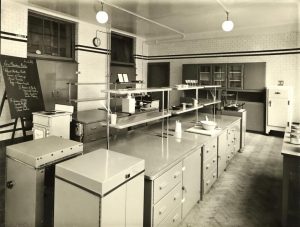A Wellcome Trust Research Resources Project
Sorting through the records of the Glasgow and West of Scotland College of Domestic Science my eye was caught by the striking blue cover of a magazine, The Electrical Age. It had the feel of an early Flash Gordon film title about it. On closer inspection I discovered that it was a 1937 publication about electricity which was aimed at women. Immediately I wanted to find out more.
The Electrical Association for Women (EAW) was founded in London in 1924 with the aim of helping women to adopt electric power in the household. In the early 1920s, although domestic electricity was available, it was a luxury that only the wealthiest households could afford. The incredible benefits that it could bring to the lives of women, however, were soon realised. The EAW’s underlying belief was that:
electricity frees women from drudgery to enable them to enjoy a fuller life outside the home
As well as providing educational resources and training for women on electricity, the EAW also acted on behalf of women to ensure that their needs were being taken into consideration by the electrical suppliers and appliance manufacturers. The first branch of the EAW opened in Glasgow in 1925 and quickly expanded to have branches across the country and abroad. It was forward thinking for the time as the first American-made models of electric refrigerators had only just started appearing in UK in 1925 and it was not until 1926 that the National Grid was set up.
- Advert from Students’ Welfare Scheme, Grand Bazaar Programme, 1927
- Advert for EAW poster, 1937
- Advert from “The Electric Age”, 1937
As well as The Electric Age, the EAW also published textbooks, including The Electrical Handbook for Women and Electric Cooking Craft. In 1927 it carried out a survey on electric cookers, asking women about their design and performance and encouraging the manufacturers to adopt the recommendations from their findings. Surveys of other domestic appliances followed and in 1933 the EAW published their report The Design and Performance of Domestic Electrical Appliances. The EAW also campaigned to make the purchase of electrical appliances more affordable for the average household, successfully pushing for reductions in purchase tax on labour-saving devices.
Dorothy Melvin, Principal of the Glasgow and West of Scotland College of Domestic Science, was keen to keep the institution up-to-date with advances in electricity. She was reported to have said that the College was the first in Britain to have an electric cooker. The early minute books of the College are certainly peppered with references to electrical matters. In June 1926, sisters Janet and Mary MacKirdy, lecturers at the College, were granted a leave of absence to travel to the United States and look at “labour-saving and modern household devices”. Mary MacKirdy later published an article in the July 1929 issue of the EAW’s The Electrical Age, titled ’The Electric Refrigerator – A Week-end Menu’. In it she stated “I am certain that in the near future a refrigerator will be one of the accepted furnishings of a house and there will be no more worry as to whether the joint, cooked or uncooked, will keep fresh.” In a later newspaper article it was reported that Janet MacKirdy, was “the first Scottish woman to qualify for the EAW Diploma in electrical housecraft”. In 1930 Dorothy Melvin instigated the purchase of a demonstration switchboard. This was used as a teaching aid to show students and members of the public how electricity could be used. It was the first of its kind to be installed in Scotland.
Not surprisingly, the College had close ties to the EAW. When it introduced certificated courses in Electrical Housecraft, the College became a recognised training centre for them. From 4-8 July 1932 the College hosted the EAW Glasgow and District Branch Summer School, a 5 day course in Electrical Housecraft. In the 1933-34 College syllabus a short practical course in Applied Electricity was introduced. The following year two short courses were offered in Household Electricity and EAW certification was being integrated into its courses for domestic science teachers and institutional managers. The Governors’ Report of January 1939 states that 47 students of the College qualified for the EAW certificate the previous year, including 5 who gained a distinction, out of 12 distinctions across Britain.
- EAW Summer School Programme, 1937
- Newscutting of EAW Summer School, 1937
In 1937 the third EAW Summer School of Electrical Housecraft was held at the College. Caroline Haslett, Director of the EAW commented that when she had visited the College the previous year she had been “greatly impressed by its new appliances and installations, in particular, the dietetic kitchen”. It was those facilities that were to feature in the archive’s copy of The Electrical Age which had sparked my initial interest. By 1937 electricity figured prominently in the 24 kitchens, 5 laundries, 14 sewing rooms, residences and model flats in the College. It was claimed to have the most electrical items of any College and was an exemplar for demonstrating to women what could be attained.
Kirsty Menzies
Wellcome Trust funded Project Archivist
References
McCallum, Carole “History of the Institution: Report 1918-1945”
Governors and appointed committees’ minutes of meetings from 14 Jun 1923-21 Dec 1934, Ref QC/1/2/1/4
Governors and appointed committees’ minutes of meetings from 16 Jan 1935-20 Nov 1940, Ref QC/1/2/1/5
Newscuttings Book 1931-43, QC Collection
Glasgow and West of Scotland College of Domestic Science, Prospectus Session 1933-34 and 1934-35, QC Collection
EAW Silver Jubilee Book 1950, Electrical Association for Women, Baillie’s Institution Special Collection
IET Archives online exhibition, ‘Electrical Association for Women – History and Policy’ The Institution of Engineering and Technology. Online at https://www.theiet.org/resources/library/archives/exhibition/women/eaw.cfm [Accessed: 05/04/2018]
IET Archives Blog, ‘The Electrical Association for Women (EAW) – Recipes from Earlier Decades’, The Institution of Engineering and Technology. Online at https://ietarchivesblog.org/2016/05/25/the-electrical-association-for-women-eaw-recipes-from-earlier-decades/ [Accessed: 05/04/2018]
